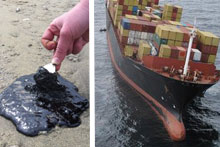So many questions, so many answers including for some of them "What are you smoking"
 .
.There is no site of the type you ask about as far as I know. It would all be uniformed conjecture, rumours and misinformation so I'm not sure what value it would bring apart from giving the chattering ones somewhere to chat.
Will, limit myself to the "Awanuia" - I don't know who is calling it a barge (the media maybe) but it is indeed a sea tanker, not a motorised barge and advising that you can get an idea of some of the vessels at the site from the AIS data at www.marinetraffic.com and, for example, the "Awanuia" can be seen there.
EDIT: Meant to say the "Rena" is not the 30 whatever years old that you say - was built in 1990. Makes a better story though for the media if they say it old, most readers wouldn't know.

 .
. 


